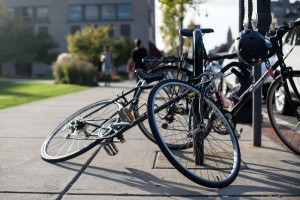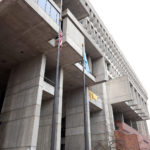
Bike crimes, including thefts and vandalism, have increased on Boston University’s campus and in the city, as bikes are becoming a more widely chosen mode of transportation.
Boston’s ridership has more than doubled since the City’s Boston Bikes program was started in 2007, increasing by 122 percent from 2007 to 2009, according to the City’s bike statistics.
The BU Police Department has received 21 reports of stolen bicycles since the start of the 2014-15 academic year, said BUPD Deputy Director of Public Safety Scott Paré. In other cases, pieces of bikes have been stolen or bikes have been damaged.
“We’ve had 61 larcenies reported, one-third of them being bikes,” Paré said. “They take the front wheel off one bike, and the front wheel off another, and off they go.”
Bike cages have been implemented on BU’s Medical Campus for those in need, Paré said. These cages can be accessed using a registered card distributed by BU Bike Safety.
“It’s just like the [Warren Towers] bike garage,” he said. “You just swipe in and store your bike in there. It adds an extra layer of protection.”
BU is actively working to combat bike crime on campus. Literature on bike safety, and particularly bike theft, has been distributed to hundreds throughout the BU campus, as well as Boston College, Massachusetts Institute of Technology, Northeastern University and Harvard University, said William Hajjar, director of BU’s Parking and Transportation Services.
“Universities in these areas tend to have a large population of student and other cyclists commuting on a daily basis,” he said in an email. “Any bike that can quickly or easily be removed is susceptible [to crime]. We continue our attempts along with BUPD to enlighten the University community with education through our bike safety website and initiatives.”
Galen Mook, founder of the Allston-based CommonWheels Bicycle Collective, said bikes, or parts of them, are stolen because people neglect to lock their bikes or the wheels, but bicyclists must take responsibility for their property.
“I don’t think it’s people that are targeted. It’s bikes that are targeted, but there are definitely people who spend a little more concern locking their bikes and people who spend a little less concern locking their bikes, and students are definitely in the less-concerned bracket,” Mook said.
More than 95 percent of Massachusetts Bay Transportation Authority stations have bike racks accessible to commuters. The MBTA implemented the “Pedal & Park” bike parking facilities, which became open to the public in Summer 2014 in more than 14 T stations around Boston and the surrounding areas. Each facility can store 50 to 150 bikes.
David Watson, executive director of the nonprofit group Massachusetts Bicycle Coalition, echoed Mook’s sentiment, blaming the locks many select because of price or convenience.
There has been an exponential rise in bikers within the city, which has created more opportunities for thefts to occur, and shoddy locks are a common cause of the problem, Watson said. People often choose to spend less for locks, which can be problematic later on.
Watson recommended that buildings should convert already-existing space into indoor bike racks, much like the existing bike garage in Warren Towers.
“I know space is always at a premium at BU, but another option is to think about repurposing existing indoor space as secure bike parking,” he said. “I still see lots of people using cable locks, which are light and convenient, but utterly ineffective at preventing your bike from getting stolen. You need to use one of the heavier steel locks.”
Zoe Thompson, a freshman in the College of General Studies, said she noticed that bike crimes around campus were prevalent, despite the precautions.
“I’ve seen so many bikes around campus missing tires,” she said.
Luis Jimenez, 24, of South Boston, said he admires BU’s unique culture of alternative transportation.
“BU is definitely bike-friendly,” he said. “[There are] bike racks next to the entrances, the Hubway stations and so many students on bikes.”
Sean Smith, a sophomore in the College of Arts and Sciences, echoed Jimenez saying BU is a bike-friendly campus.
“It depends on where you live, but there are many options,” he said. “There’s the bike room in Myles [Standish Hall], the garage in Warren [Towers] and many more great options.”



Thanks for sharing your thoughts about bikes. Regards